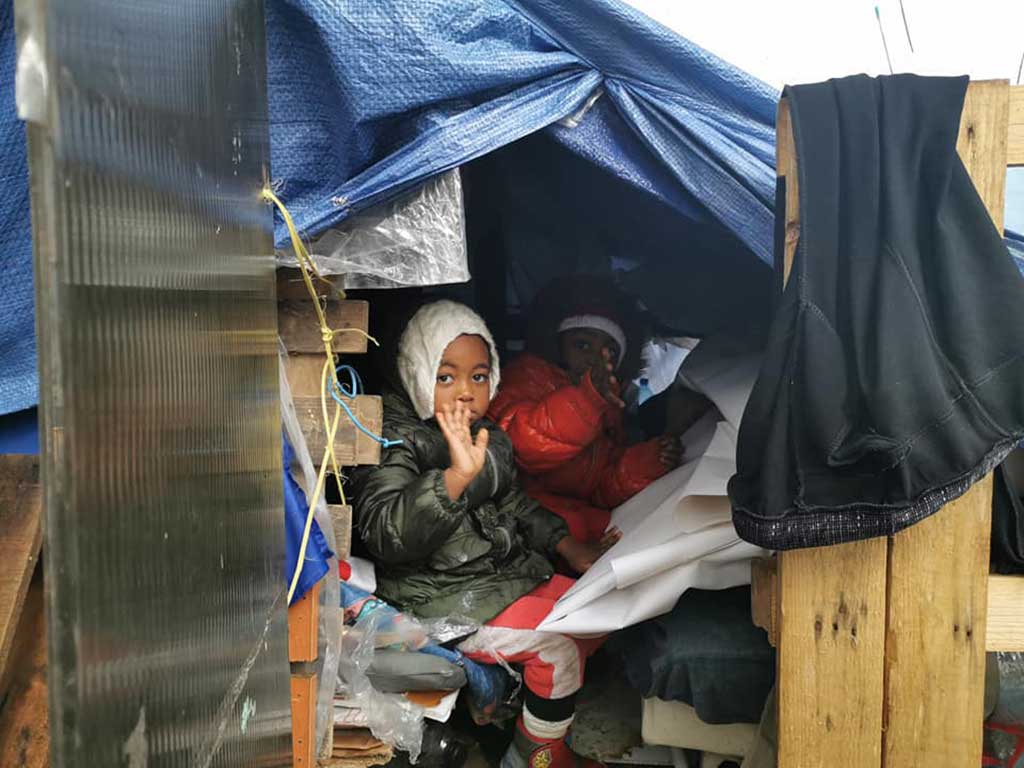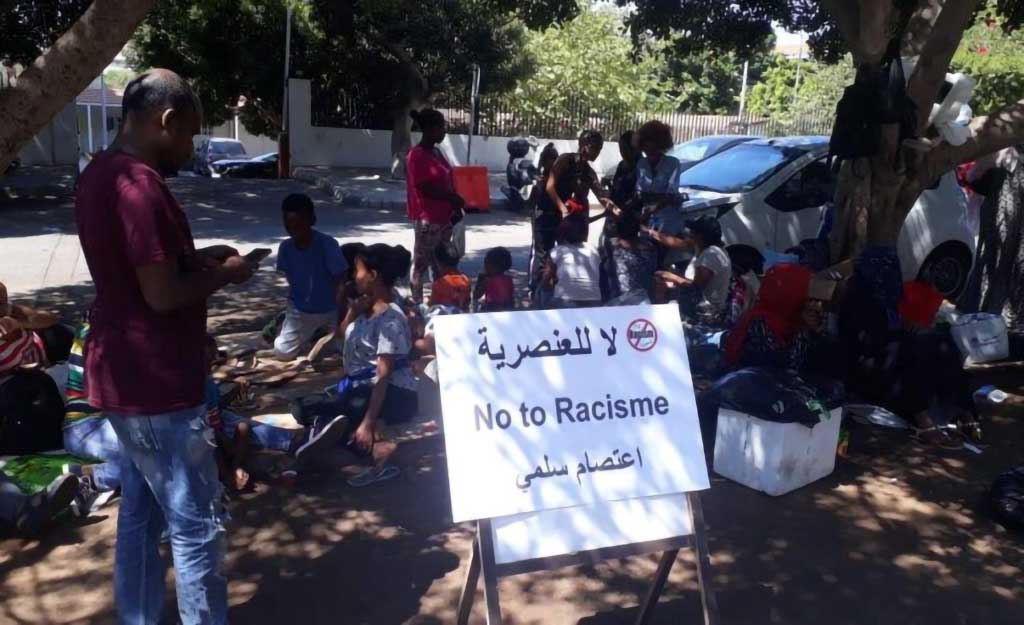UNHCR Complicit in Detention of Sudanese Refugees and Asylum Seekers
December 22, 2019
Case Advocacy.
Policemen detained ten Sudanese and Ethiopian refugees and asylum seekers on Thursday, December 3rd, 2019, after more than two months of peaceful protest in front of the UNHCR building in Jnah. UNHCR staff called the police and reportedly sent 30 of its own security staff to forcibly remove the protestors, after they blocked the entrance to the building in a peaceful escalation attempt to have their demands heard. Three of the detainees, all Ethiopian women, were released on the same day while six Sudanese men and one Ethiopian man remain in custody today.
A group of 10 children and at least 15 men and women, two of whom are pregnant, remain on the street full time with no shelter, despite heavy rainfall and cold weather this past week. Five of the protestors reported that UNHCR canceled their monthly cash assistance due to their participation in the protest. Pooling their resources together, the group lives on bread and tomatoes on most days. At least 11 adults and 3 children require urgent medical attention. Five single women and 6 families are homeless, and another family and single man are in immediate risk of eviction due to their inability to pay rent.[1]
We call on UNHCR to rectify its history of negligence towards Sudanese and African asylum seekers and refugees in Lebanon and respect its mandate to protect all refugees and asylum seekers. [Read our Open Letter to UNHCR here]

Years of Grievances Against UNHCR
Since 2010, African men, women and children of predominantly Sudanese nationality have staged numerous peaceful protests, sit-ins, and hunger strikes in front of UNHCR, demanding, first and foremost, that UNHCR speed up their decision-making processes for asylum claims. Gaining refugee status would facilitate greater protection, school enrolment, access to aid, and opportunities for resettlement. Testimonies from the Sudanese community reveal that the application processing time for asylum claims is too slow, with some applications pending for years
There are currently 1,902 recognized Sudanese refugees and asylum seekers in Lebanon, which constitutes around 9% of non-Syrian refugees and asylum seekers in the country. These figures exclude Sudanese migrants who reside in Lebanon but have not attempted to gain official refugee status, as well as those whose claims have been rejected and dependents on their files, typically spouses and children. UNHCR data from 2016 (the latest available online) reveals that the rate of approval for refugee status among the Sudanese community in Lebanon was at 17% in 2016, while 50% of new applications were rejected and 33% marked as “otherwise closed.” 946 applications were still pending by the end of that year alone, demonstrating a clear need for increased human resources to process their files.
Table 1: Timeline constructed from available online records of these protests. We believe that more protests have taken place and gone completely unreported by the media.
| Oct 7, 2019 – today (ongoing) | On 3/12/19, UNHCR calls police and sends 30 security guards to forcibly remove the protestors from their campsite. Policemen detain 9 refugees and asylum-seekers, 6 of whom are still in custody. | |
| Aug 24 – Sep 5, 2019 | UNHCR ends a 13-day peaceful sit-in with an unwritten promise to look into the casefiles of the protestors provided they call off their protest. | |
| Nov 2018 | Three refugees detained in General Security for lacking residency go on hunger strike in protest of practices of UNHCR | |
| Jul 10 – Oct 10, 2015 | UNHCR security guards end a 4-month peaceful sit-in by beating up a few protestors on a Saturday when the office was closed. | |
| Dec 10 – Dec 12, 2014 | UNHCR ends a 3-day peaceful protest by calling the police. | |
| Jun 11 – Aug 4, 2012 | UNHCR ends a 50-day hunger strike by calling the police. The police arrest 13 peaceful protestors. | |
| 2010 | Dr. Abed el Meneem, Sudanese Human Rights activist and community leader, holds a hunger strike that lasts more than two weeks |
UNHCR Complicit in Detention & Deportation
“As soon as we do anything, they immediately call the police on us”
Sudanese woman asylum seeker, December 2019
Most protests by the Sudanese community in front of the UNHCR have ended with UNHCR staff calling the police to force out the protestors, resulting in the arrest of those who refused to leave. UNHCR has previously admitted to calling the police to clear the entrance of the building but has exonerated itself from any responsibility for the ensuing violence and arrests.
Calling the police to break up the protests makes UNHCR complicit in the unlawful detention of Sudanese refugees and asylum seekers and their potential deportation.
After years of operating in Lebanon, UNHCR must acknowledge that calling the police, under any pretext, constitutes a threat to asylum seekers and refugees’ safety and rights. This is especially true today with the accumulating evidence against the General Security’s unlawful detentions and deportations of refugees and their failure to abide by the principle of non-refoulement. Arrests often directly result in prolonged detention and family separation, and commonly lead to deportation as most refugees and asylum seekers do not have valid residency permits.
The table below provides a sample of the General Security’s practices with asylum seekers and recognized refugees.
| 2018 | GS deports at least 7 non-Syrian recognized refugees and attempts to deport at least 3 other recognized Sudanese refugees held in prolonged arbitrary detention. | |
| 2017 | GS deports at least 8 non-Syrian recognized refugees. | |
| Sep 2010 | GS attempts to forcibly return a recognized Sudanese refugee, Muhammad Babikir Abd al-Aziz Muhammad Adam, beats him, holds him in prolonged solitary confinement, forces him to sign papers he could not read, in an attempt to coerce a “voluntary return.” | |
| Jun 2010 | General Security (GS) forces raid a cancer fundraiser attended by Sudanese, Ethiopians and Somalis, brutally assault them and detain a number of them. |
These incidents do not reflect the true scope of the problem as it is probable that some detentions and deportations have gone unnoticed and undocumented by the media and human rights organizations.
UNHCR Violates Refugees’ Right to Protest
“One person held my hands back, one person hit me in the stomach and they threw me over a metal gate”
Al Ghazouli, Sudanese refugee, March 2016
The violations of 2019 are not new. In addition to calling the police, UNHCR has resorted to several tactics to break up the protests over the years. Testimonies collected in 2015, 2016 and 2019 by journalists and ARM’s team reveal intentional use of violence and an excessive reliance on security personnel. Policemen and security staff harass protestors, confiscating and destroying their makeshift shelter and belongings, including milk for children, with no intervention from UNHCR.
UNHCR also resorted to cutting the protestors’ access to water, forbidding access to bathrooms, forbidding the protestors from putting up tents and bringing mattresses and forbidding the reentry of protestors who left the site to bring food for the others.
UNHCR repeatedly promised to look into the case files of the protestors in exchange for their silence and their signing a commitment not to protest outside of UNHCR doors again.
These practices violate the asylum seekers and refugees’ right to protest. As far as we know, no actions have been taken to hold staff members accountable for these practices.
Taking No Responsibility
In response to questions by the media about the protests of the Sudanese community, UNHCR blames the system and takes no responsibility for its own actions and inaction. They blame asylum countries for having limited quotas for Sudanese and other non-Syrian refugees, thereby making their resettlement rare and slow. However, complaints of Sudanese asylum seekers are not restricted to the resettlement waiting period but include primarily the waiting time resulting from UNHCR’s internal mechanisms for Refugee Status Determination, as well as access to protection and cash assistance, and basic communication and information sharing. More importantly, their answer overlooks their responsibility to advocate with asylum countries for larger quotas for the Sudanese community in particular and the refugee population as a whole. UNHCR has also repeatedly failed to condemn the Lebanese government’s policies of detention and deportation of asylum seekers and recognized refugees.
[1] After the events on December 3rd, 2019, ARM has surveyed 21 adults, some on the street full time and some who join the sit in part-time. Numbers do not include the six detainees.
Tags :
African Refugees,Lebanon,Protest,Sudanese,UNHCR
Share This :
Related Posts
Justice for Faustina: We call for a proper investigation into Faustina’s death and real accountability for her perpetratorsApril 11, 2020
Activist Detained by General Security, at Risk of Deportation, Torture and DeathFebruary 14, 2020
UNHCR Complicit in Detention of Sudanese Refugees and Asylum SeekersDecember 22, 2019
Have Any Questions?
To inquire about this statement and the context, email us or fill the form.
